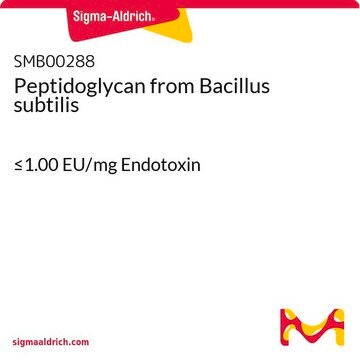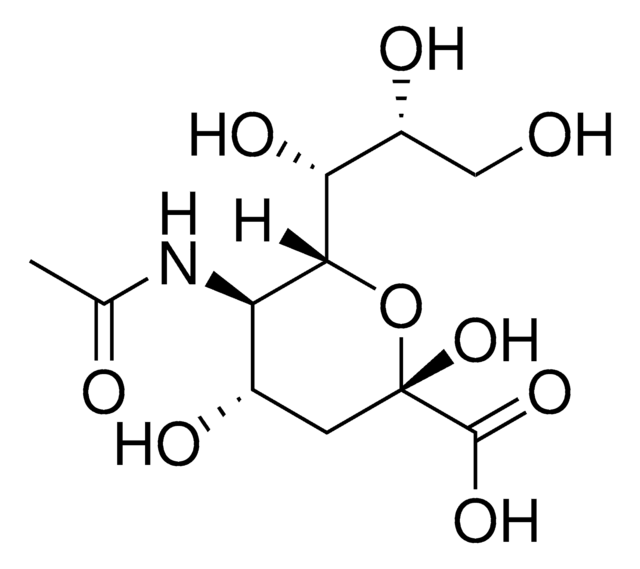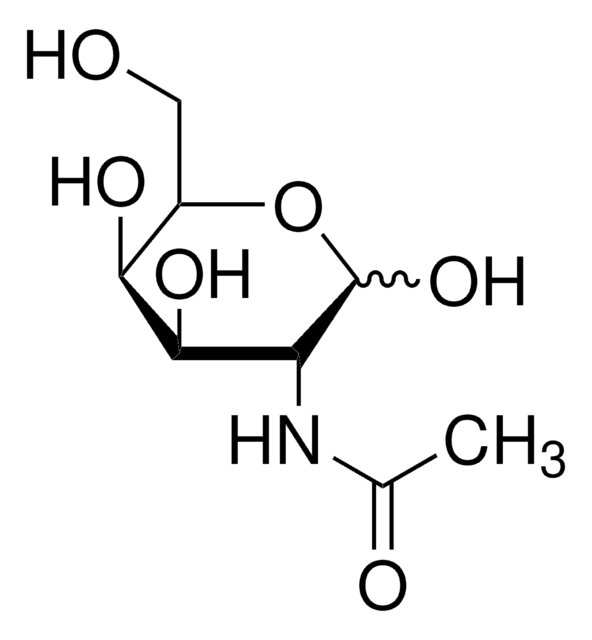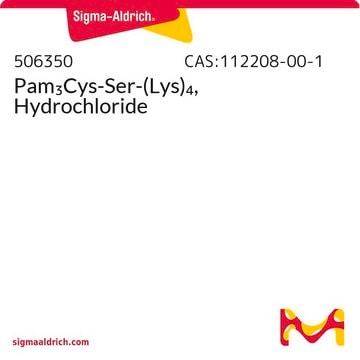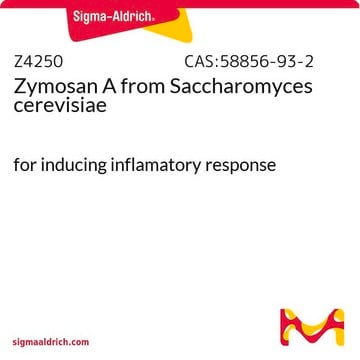77140
Peptidoglycan from Staphylococcus aureus
cell wall component
Synonym(s):
Peptidoglycan from S. aureus
Sign Into View Organizational & Contract Pricing
All Photos(1)
About This Item
Recommended Products
Quality Level
form
lyophilized powder
solubility
soluble, hazy to turbid, colorless to faintly yellow
storage temp.
−20°C
Related Categories
Application
Peptidoglycan from Staphylococcus aureus has been used:
- for the stimulation of lymphocytes: peptidoglycan activates the toll-like receptor 2 (TLR2), present in mammalian cells. It works as an antagonist of Poly (I:C)
- for g-type lysozyme stimulation by intraperitoneally inoculating it into sole specimens
- in phosphate buffer saline and injected into Labeo rohita fingerlings, to study its effect on nucleotide-binding oligomerization domain-2 (NOD-2) gene expression
Biochem/physiol Actions
The cell wall of gram positive bacteria is largely made up of peptidoglycan. It is composed of polysaccharide chains interlinked by peptide bridges. This peptidoglycan gives a certain rigidity to the cell wall and gives the cell mechanical strength. It is a surface molecule which is known to stimulate immune reactions including cytokine production to fever.
Packaging
Bottomless glass bottle. Contents are inside inserted fused cone.
Other Notes
Major component of the cell wall in gram positive organisms. Consists of a glycan backbone with alternating β 1-4 linked residues of N-acetyl-D-glucosamine and muramic acid. The immunological activities of bacterial peptidoglycans; Peptidoglycan types of bacterial cell walls and their taxonomic implications; Antibody response to peptidoglycan during staphylococcal infections
Storage Class Code
11 - Combustible Solids
WGK
WGK 3
Flash Point(F)
Not applicable
Flash Point(C)
Not applicable
Personal Protective Equipment
dust mask type N95 (US), Eyeshields, Gloves
Certificates of Analysis (COA)
Search for Certificates of Analysis (COA) by entering the products Lot/Batch Number. Lot and Batch Numbers can be found on a product’s label following the words ‘Lot’ or ‘Batch’.
Already Own This Product?
Find documentation for the products that you have recently purchased in the Document Library.
Customers Also Viewed
Xue Kong et al.
Frontiers in physiology, 9, 1476-1476 (2018-11-09)
Vesicomyidae clams are common species living in cold seeps, which incorporates symbiotic bacteria into their body maintaining endosymbiosis relationship. As members of pattern recognition receptor (PRR) family, peptidoglycan recognition proteins (PGRPs) recognize pathogen associated molecular patterns and play an important
L J Wheat et al.
The Journal of infectious diseases, 147(1), 16-22 (1983-01-01)
Levels of antibodies to peptidoglycan were measured by solid-phase radioimmunoassay in 76 patients with Staphylococcus aureus infections and 44 patients with infections caused by other bacteria. Levels of IgM antibodies to peptidoglycan were elevated in 24% of the patients with
ABC transporters involved in the biogenesis of the outer membrane in gram-negative bacteria
Narita S
Bioscience, Biotechnology, and Biochemistry, 75(6), 1044-1054 (2011)
Molecular characterization of nucleotide binding and oligomerization domain (NOD)-2, analysis of its inductive expression and down-stream signaling following ligands exposure and bacterial infection in rohu (Labeo rohita)
Swain B, et al.
Developmental and Comparative Immunology, 36(1), 93-103 (2012)
Sara Abouelasrar Salama et al.
Mediators of inflammation, 2020, 6087109-6087109 (2020-07-23)
The serum amyloid A (SAA) gene family is highly conserved and encodes acute phase proteins that are upregulated in response to inflammatory triggers. Over the years, a considerable amount of literature has been published attributing a wide range of biological
Articles
Peptidoglycan structure: alternating GlcNAc and N-acetylmuramic acid cross-linked to peptides form the basic backbone.
Our team of scientists has experience in all areas of research including Life Science, Material Science, Chemical Synthesis, Chromatography, Analytical and many others.
Contact Technical Service

